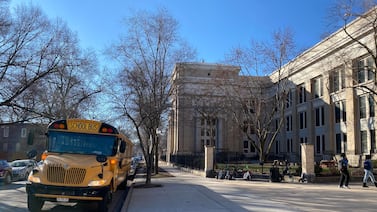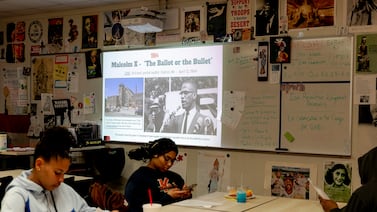Sign up for Chalkbeat Colorado’s free daily newsletter to get the latest reporting from us, plus curated news from other Colorado outlets, delivered to your inbox.
Denver schools are doing a better job complying with Denver Public Schools’ discipline matrix, according to data discussed at a school board meeting Monday.
The matrix is a guide for school staff about when they can suspend or expel a student and dictates when they should or should not call the police.
The data shows that 94% of about 8,000 discipline responses were “permissible” under the matrix this school year so far, meaning that the disciplinary action the staff meted out was appropriate under the district’s guidelines. That’s compared with 83% of incidents being permissible last school year.
“Discipline permissibility is an indicator of the climate of a school,” DPS Superintendent Alex Marrero told board members. “This measure focuses on whether or not schools are appropriately resolving discipline incidences.”
The permissibility measurement is new this year. District officials have been emphasizing to principals the importance of following the matrix to ensure that discipline is the same from school to school. At the same time, the district is revising the matrix in the hopes of reducing racial disparities.
The matrix came under scrutiny after a March 2023 shooting inside Denver’s East High School. The East student who shot and injured two deans had previously been expelled from a neighboring district and was being searched daily for weapons by East staff.
That the student was allowed to enroll in and remain at a traditional public high school caused parents and community members to question the district’s approach to discipline.
The discipline matrix was last updated in 2021. It is currently undergoing a rewrite that district leaders have promised will be informed by recommendations from a community committee that met between October and December. The new matrix is set to debut this fall.
The data discussed Monday is based on the 2021 matrix. It shows that schools are doing a better job complying with the discipline matrix overall and for different student groups.
For example, the data shows that last school year, only 80% of discipline responses to incidents involving Black students at district-run schools were permissible under the matrix. This year, 93% of responses to incidents involving Black students have been permissible.
The data also shows Black students continue to be disproportionately disciplined. Out of 8,086 discipline incidents at district-run schools this school year, 28% involved Black students, the data shows. Black students make up about 14% of the student population in DPS.
The suspension rate for of Black students is down from 14% last school year to nearly 10% so far this school year, the data shows. That’s far higher than the overall suspension rate of 3.5%.
Disproportionate discipline, especially with regard to Black students, has been an ongoing problem for DPS. One of the reasons the district is revising its discipline matrix is that DPS was facing corrective action by the state because of the disproportionality, Marrero said.
The new permissibility metric shows that while “there’s still a tremendous amount of growth and areas of improvement … we are trending better,” Marrero said.
Melanie Asmar is the bureau chief for Chalkbeat Colorado. Contact Melanie at masmar@chalkbeat.org.







